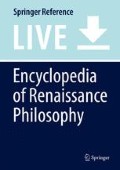Abstract
We have come to call “Pléiade” a group of French poets of encyclopedic learning [Joachim du Bellay (Deffence et illustration, 1549), Pierre de Ronsard, Pontus de Tyard, Jean-Antoine de Baïf, Jacques Peletier du Mans, Rémi Belleau, Etienne Jodelle] who aimed to revitalize the classical arts and to argue for a demanding poetry in the vernacular, both erudite and inspired. Their high-handed style contrasted with that of their predecessors (the Grands Rhétoriqueurs and Marotic poets), and their poetic production was varied.
The Pléiade had an important lexical and poetic impact. Its principles were inseparably literary and philosophical, due to a humanist trust in language’s capacity to reveal the hidden qualities of things as well as in the signifying power of classical, allegorical myth (cf. Jean Dorat’s teachings). They attracted criticism because of their erudition, but also because of Reformist rejection of pagan myth and “useless” profane poetry.
The Pléiade poets embraced philosophy and the sciences, especially mathematics, cosmology and meteorology, astrology, music, bestiaries, and lapidaries. They played a pivotal role in two Academies and some contemporaneous philosophical dialogues featured them on poetry or natural philosophy. As regards the philosophy of love, they explored the philosophical and literary innovations arriving from Italy (Neoplatonism, Petrarchism), at least temporarily; these influences were, however, enmeshed with the dominant Aristotelianism.
The influence of the Pléiade was so powerful that Ronsard came to represent negatively the Renaissance legacy for the following century. It also extended in other vernacular languages in Europe.
References
Primary Literature
Dorat, Jean. 2000. Mythologicum, ed-trad: Ford Ph. Genève: Droz.
Goyet, F. (ed.). 1990. Traités de poétique et de rhétorique de la Renaissance. Paris: Librairie Générale Française.
Bruès G. de. 1953. Les Dialogues, ed. Morphos, P.P. Baltimore: Johns Hopkins Press.
Le Caron L. 1986. Dialogues, ed. Buhlmann, J.A., Gilman, D. Genève: Droz.
La Porte M de. 2009. Les Epithetes, ed. Rouget, F. Paris: Champion.
Opitz. 2009. Le Livre de la poésie allemande, ed-trad: Rothmund, E. Toulouse: Presses Universitaires du Mirail.
Pineaux, J. (ed.). 1973. La Polémique protestante contre Ronsard. Paris: Didier.
Ramus [La Ramée P. K]. 1996. Dialectique, ed. Bruyère, N. Paris: Vrin.
Speroni S. 1978. Dialogo della retorica et Dialogo delle lingue. In Trattatisti del Cinquecento, ed. Pozzi, M. t I. Milan-Naples: Riccardo Ricciardi.
Secondary Literature
Castor, G. 1964. Pleiade poetics: a study in sixteenth-century thought and terminology. Cambridge: University Press.
Chamard, H. 1939–1963. Histoire de la Pléiade, 4 vols. Paris: Didier.
Jarrety, M., et al. 1997. La Poésie française du Moyen Age jusqu’à nos jours. Paris: PUF.
Laumonier, P. 1909. Ronsard, poète lyrique: étude historique et littéraire. Paris: Hachette et Cie.
Meerhoff, K. 1986. Rhétorique et Poétique au XVI e siècle en France. Du Bellay, Ramus et les autres. Leyde: Brill.
Ménager, D. 1979. Ronsard : le roi, le poète et les hommes. Genève: Droz.
Pouey-Mounou, A.-P. 2002. L’Imaginaire cosmologique de Ronsard. Genève: Droz.
Raymond, M. 1927. L’Influence de Ronsard sur la poésie française (1550–1585). Paris: Droz.
Schmidt, A.-M. 1938. La Poésie scientifique au XVI e siècle. Paris: Albin Michel.
Simonin, M. 1990. Pierre de Ronsard. Paris: Fayard.
Smith, M.C. 1995. Ronsard & Du Bellay versus Beze. Allusiveness in Renaissance Literary Texts. Genève: Droz.
Smith, P.J. 2010. Paix et poésie en pays d’exil : les réfugiés flamands lecteurs de la Pléiade à Haarlem autour de 1600. In Chemins de l’exil, havres de paix: migrations d’hommes et d’idées au XVI e siècle, ed. Balsamo, J., and C. Lastraioli, 289–301. Paris: Champion.
Terreaux, L. 1968. Ronsard correcteur de ses œuvres : les variantes des Odes et des deux premiers livres des Amours. Genève: Droz.
Yates, F. 1988. The French academies of the sixteenth century. Londres: Routledge.
Author information
Authors and Affiliations
Corresponding author
Editor information
Editors and Affiliations
Rights and permissions
Copyright information
© 2015 Springer International Publishing Switzerland
About this entry
Cite this entry
Pouey-Mounou, AP. (2015). Pléiade. In: Sgarbi, M. (eds) Encyclopedia of Renaissance Philosophy. Springer, Cham. https://doi.org/10.1007/978-3-319-02848-4_310-2
Download citation
DOI: https://doi.org/10.1007/978-3-319-02848-4_310-2
Received:
Accepted:
Published:
Publisher Name: Springer, Cham
Online ISBN: 978-3-319-02848-4
eBook Packages: Springer Reference Religion and PhilosophyReference Module Humanities and Social SciencesReference Module Humanities

